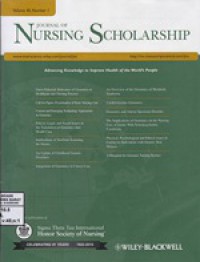
Jurnal
The Relationship Between Expectation Regarding Aging and Functional Health Status Among Older Adults in China
Purpose: To examine the level of and factors influencing expectations regarding aging (ERA) among older Chinese adults, and to determine whether leisure-time exercise mediates the association between ERA and functional health status. Methods: A population-based, cross-sectional design was utilized in this study. A total of 550 participants completed the face-to-face interview via a questionnaire addressing ERA, physical health conditions, personality and psychological factors, leisure-time exercise, and functional health status. Results: More than four fifths of the older adults felt that having more aches and pains (88.0%), lower levels of energy (82.7%), and being forgetful (82.5%) were an accepted part of aging, and 74.7% of participants reported it to be true that “being depressed is normal for older adults.” The regression model showed that depression and self-mastery were factors that influence ERA among older Chinese adults (β = −0.26, p = .000; β = 0.15, p = .000). The Instrument Activity of Daily Life andWorld Health Organization Disability Assessment scores were not associated with ERA. Leisure-time exercise mediated the relationship between ERA and functional health status. Conclusions: Older adults generally consider body function decline to be an expected part of aging. Personality and psychological factors, rather than physical health conditions, were the factors that were considered to be most influential on ERA among Chinese older adults. These findings suggest that community interventions taking into account leisure-time exercise could be influential in improving the ERA and functional health status of older adults. Clinical Relevance: For community nurses and other primary care providers, the findings of the present study may facilitate the subsequent design of community-based participatory intervention to improve ERA, as well as potentially improve the functional health status of older adults.
Availability
No copy data
Detail Information
- Series Title
-
Journal of Nursing Scholarship, Volume 45, Number 4 2013
- Call Number
-
(05) 610.5 WIL j
- Publisher
- Malden : Wiley-Blackwell., 2013
- Collation
-
Hlm. 328-335
- Language
-
English
- ISBN/ISSN
-
1527-6546
- Classification
-
(05) 610.5 WIL j
- Content Type
-
-
- Media Type
-
-
- Carrier Type
-
-
- Edition
-
Volume 45, Number 4
- Subject(s)
- Specific Detail Info
-
-
- Statement of Responsibility
-
-
Other version/related
No other version available
File Attachment
Comments
You must be logged in to post a comment
 Computer Science, Information & General Works
Computer Science, Information & General Works  Philosophy & Psychology
Philosophy & Psychology  Religion
Religion  Social Sciences
Social Sciences  Language
Language  Pure Science
Pure Science  Applied Sciences
Applied Sciences  Art & Recreation
Art & Recreation  Literature
Literature  History & Geography
History & Geography